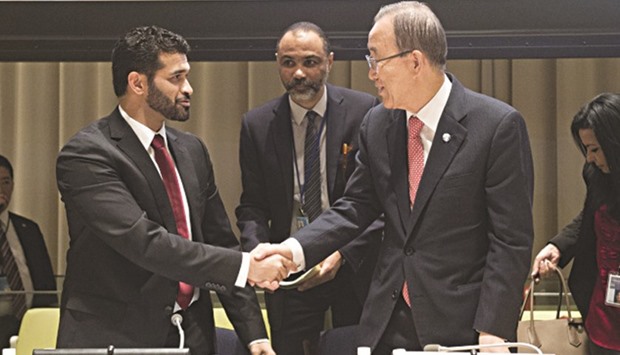The Supreme Committee for Delivery & Legacy (SC) stepped onto the global stage this week to highlight the unifying power of the 2022 FIFA World Cup Qatar at the United Nations headquarters in New York.
The SC’s Secretary General, Hassan al-Thawadi, delivered a keynote speech, alongside the UN’s Secretary General, Ban Ki-moon.
Al-Thawadi took the opportunity to address a global audience in the opening session of a high-level panel focused on “The Value of Hosting Mega Sport Events as a Social, Economic and Environmental Sustainable Development Tool”.
“Football is unquestionably the number one pastime of the Middle East,” said the SC’s secretary general. “We live and breathe the game. Wherever you go in the region, you will witness football being played - in stadiums, parks, streets, roundabouts and beaches. Football plays a vital role in the fabric of our communities. Multiple countries, multiple cultures, multiple religions - and across the Middle East I can assure you that passion for football unites us like nothing else can.”
“From the day we launched our bid we have maintained that the 2022 FIFA World Cup would not be Qatar’s World Cup but a World Cup for the entire Middle East. We passionately believe that this is the perfect time for an event of this magnitude to be held in our region.”
“If you switch on your television and turn on the news, the pictures reveal a world that appears to be ravaged by extreme and divisive rhetoric. It would suggest we live in a world where differences between peoples are exacerbated and utilised to enhance conflict rather than being celebrated. Hours of coverage and thousands of words are dedicated to explaining why we should fear people with different beliefs. In this climate of extremism, it is important to remember that a counter-narrative does exist.”
UN chief Ban highlighted the importance of creating sustainable legacies for major tournaments.
“Mega sports events have always contributed to sustainable change,” he said. “The benefits of these events have not always been long-lasting, but they must be. Mega events must leave enduring legacies that benefit societies long after games are over. All hosts of mega events should integrate sustainability at their core. Let us work together so that the motto of all mega events in the future is cleaner, greener and more sustainable.”
Later, Nasser al-Khater, assistant secretary general for Tournament Affairs, took part in a panel that focused on the challenges and opportunities associated with a landmark event such as the 2022 FIFA World Cup.
“We’re confident,’ said al-Khater, “that over the next six years everyone will see this World Cup will be a driver to really push on progress which will have a direct impact on the future of this country. World Cup tournaments in general have always been a celebration of cultures and I believe this World cup will be no different.”
The session was attended by key sporting and political figures from all over the world, offering Qatar the opportunity to deliver key messages to an influential and diverse sports panel, including Brazilian legend and two-time FIFA World Cup winner Cafu.
Also present were Laksmi Puri, assistant secretary general of the United Nations and acting head of UN Women; Wilfried Lemke, special adviser on Sport Development and Peace; basketball legend Dikembe Mutombo; and 12 times German gold medallist Paralympian Verena Bentele.
The three-hour long session offered an insight into other areas of the world’s sporting arena, featuring representatives from various other sporting organisations, private companies and other organising committees – including Russia 2018 and the Winter Olympics in South Korea in 2018.
Also representing the Middle East was Nassir al-Nasser, high representative, United Nations Alliance of Civilisations, who said: “It gives me great pleasure to talk about sustainable sport. The importance of sport in promoting peace has been recognised by the UN on many platforms. Sport is a tool that serves as a common bond which fosters tolerance and respect. It transcends all. I hope we can convey that message today.”
As the proceedings were drawing to a close, Ahmad al-Hendawi, the UN secretary general’s envoy on youth, added: “The region is desperate to reassure the youth of the Middle East. We have 100mn young Arabs. It’s the most severe crisis we have, so this World Cup is a shining example of what our youth can look forward to. We have a few more years to go so we should think more about how we engage them on this journey. I’m optimistic about having opportunities for the youth in the region.”
The UN visit was co-ordinated by Sheikha Alia Ahmed al-Thani, Qatar’s permanent representative in the United Nations.

SC Secretary General Hassan al-Thawadi shaking hands with UN secretary general Ban Ki-moon
